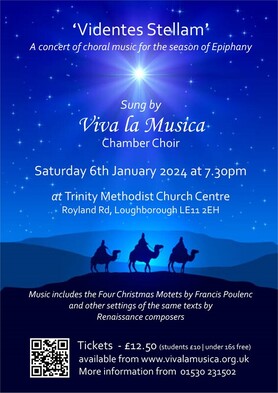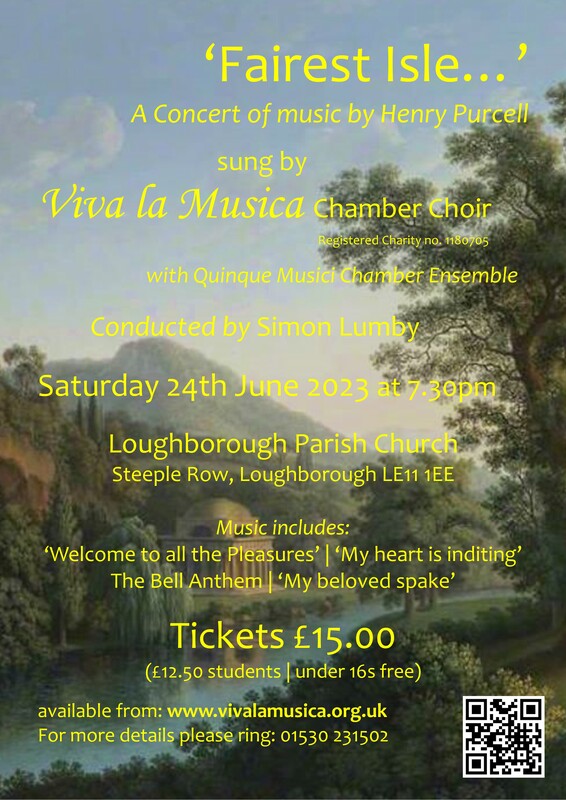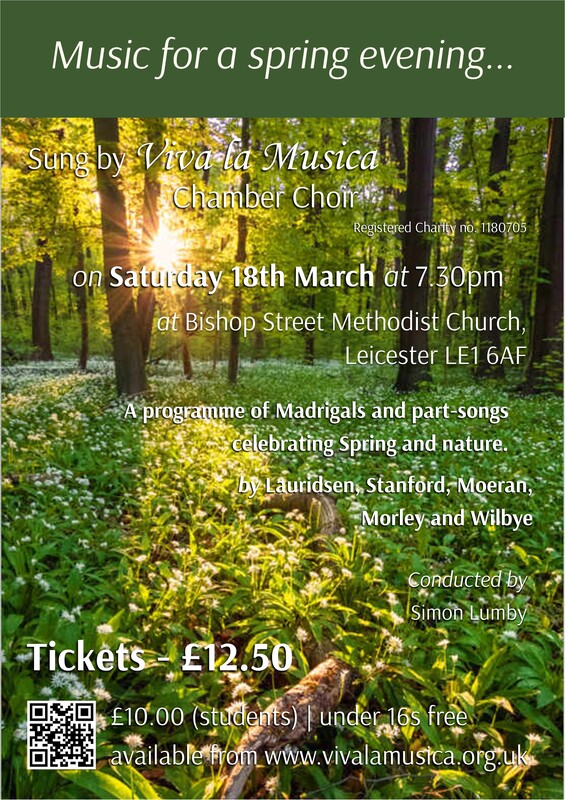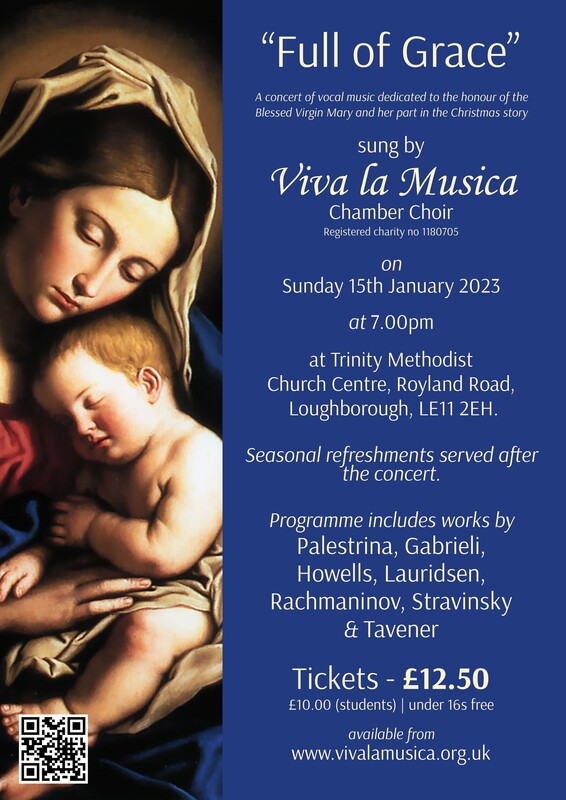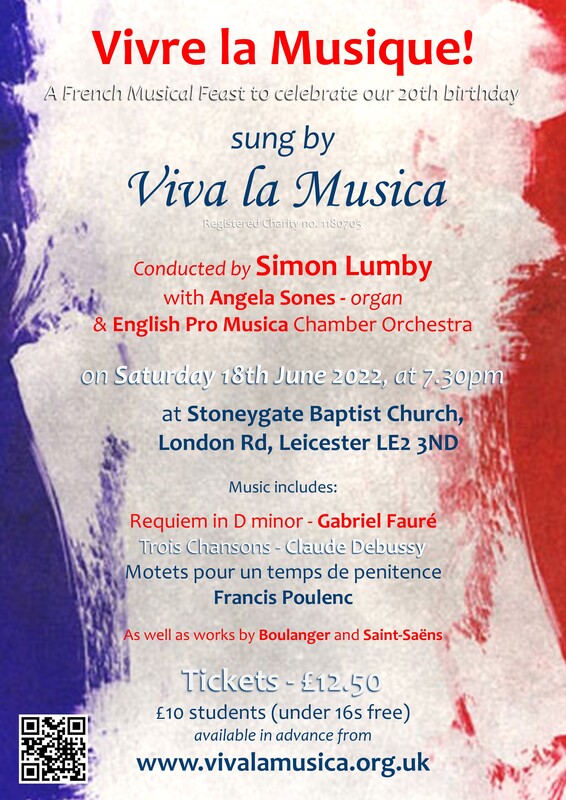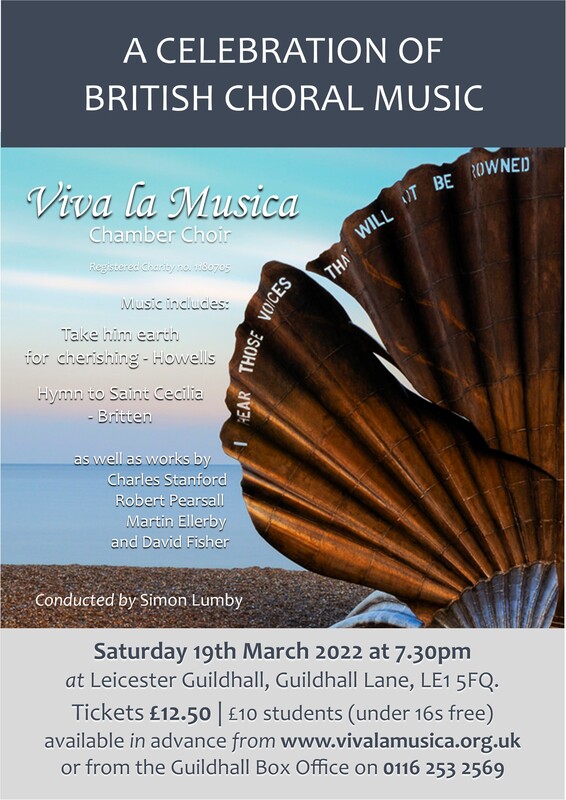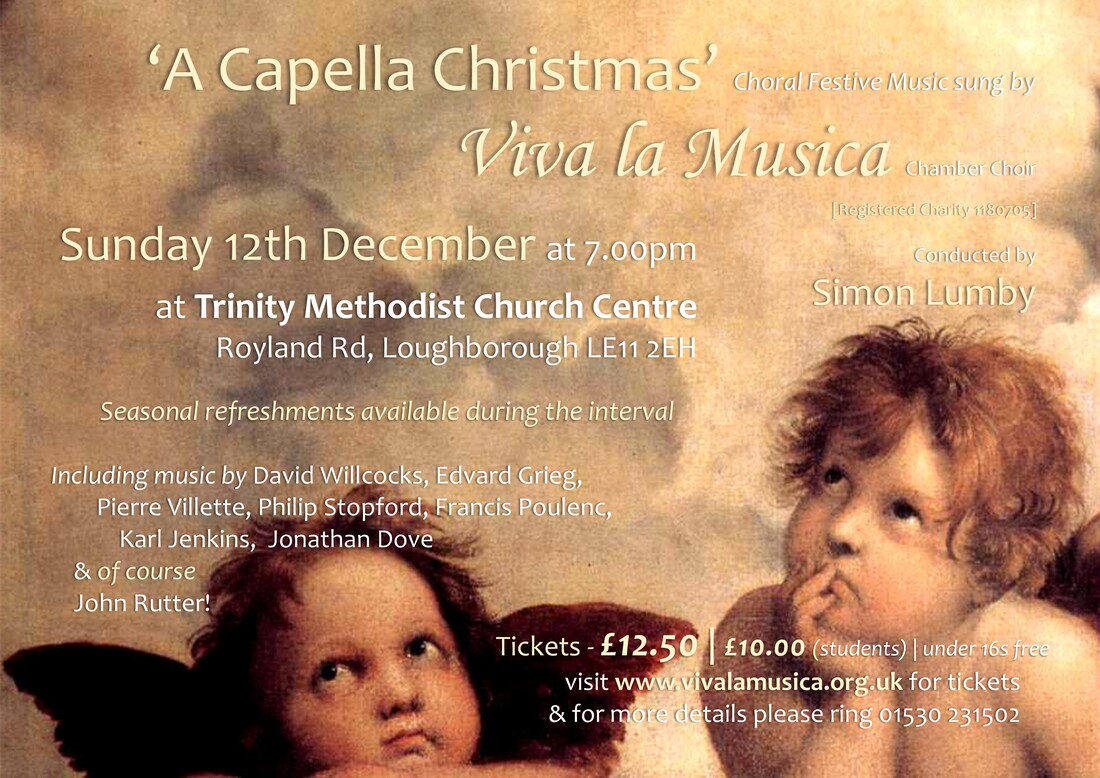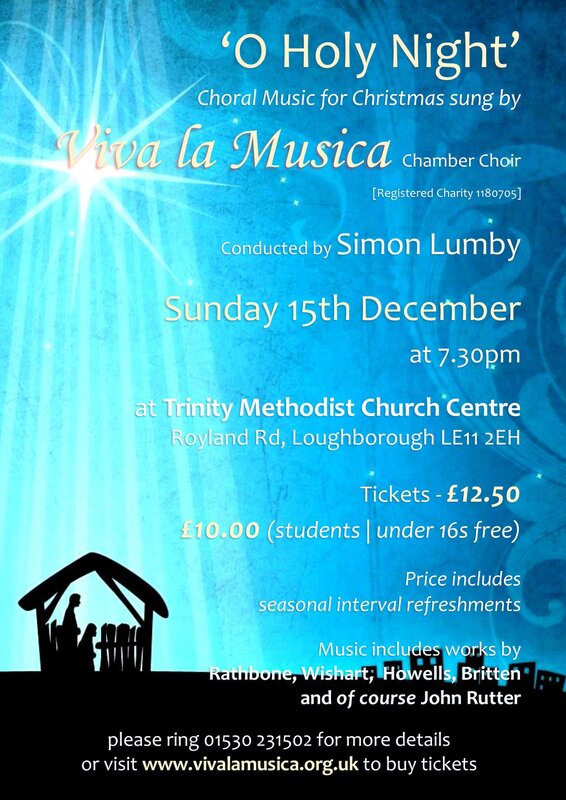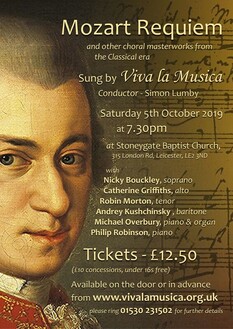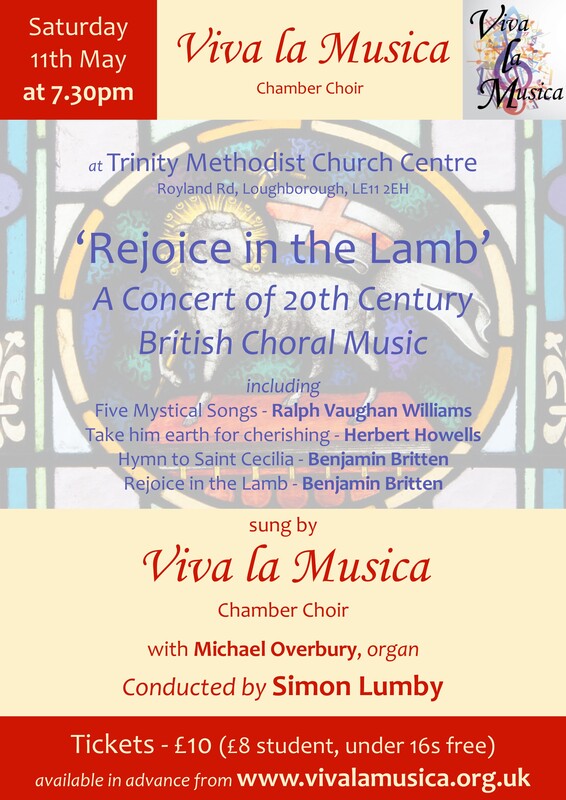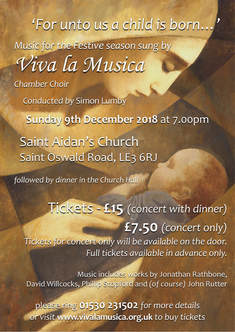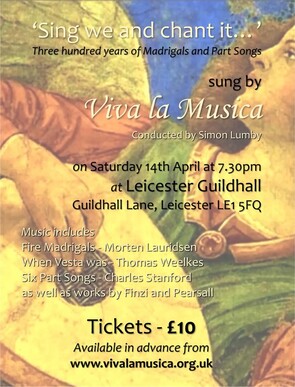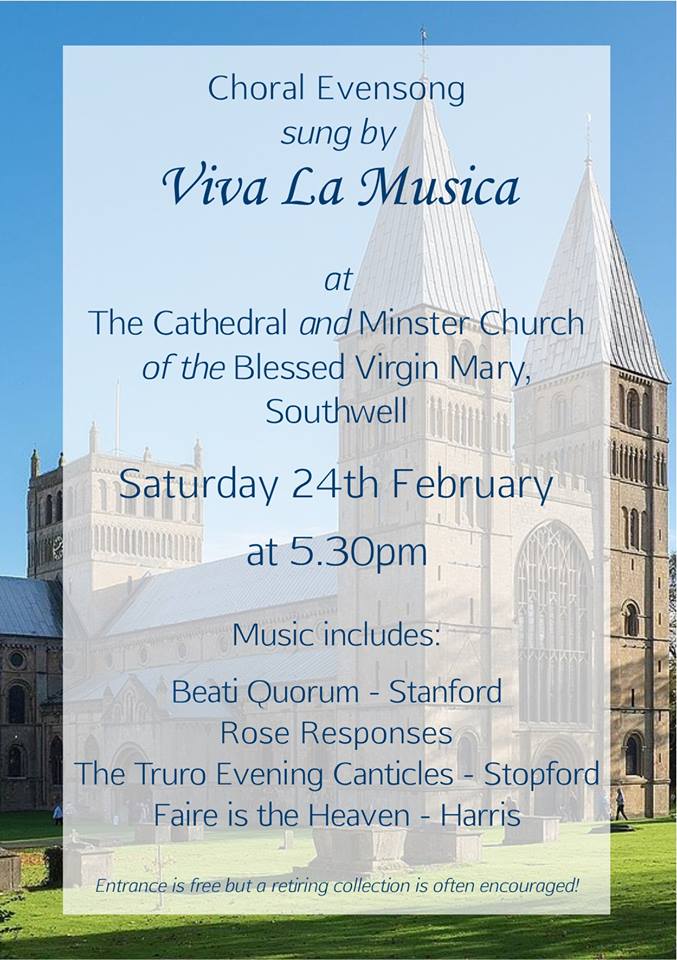What people think of Viva la Musica...
|
'Videntes Stellam' - Music for the Epiphany, Saturday 6 January 2024, Trinity Methodist, Loughborough
The Christmas festivities are over and the Magi have arrived, so a program with the title ‘Videntes Stellam’ would seem to fit neatly in our seasonal expectations. Thus it was with the offering from Viva la Musica under the direction of Simon Lumby. The chronology was suitably adapted to allow the music to follow the sequence of Francis Poulenc’s Quatre motets pour le temps de Noel written in 1951/2. The program fell into four sections with the luscious, harmonically complex music of Poulenc beautifully surrounded and illuminated by carefully curated pieces of late 16th and early seventeenth century motets by composers of the Renaissance period. Viva la Musica, as a small chamber choir is ideally placed to explore the range and variety of choral music in this concert. It produces a well-balanced and confident sound that draws the listener into its world. The group is small enough to be nimble and to be able to allow the individual lines of some of the earlier music to emerge effortlessly through the texture in pieces such as the setting of Quem Vidistis by Hans Leo Hassler, whilst at same time have sufficient forces at its disposal to be able to produce a truly exciting and vibrant fortissimo at key moments, such as the Alleluias in the setting of Quem Vidistis by Richard Dering and in the louder moments in the Poulenc motets. Opening with O Magnum Mysterium, the choir sang a setting of the words by Victoria. Immediately the sense that we were in for an evening of choral treats was established. The tone was warm and inviting with a very pleasing blend between the voices. What the ‘Alleluias’ lacked in articulation was made up for in the confident attack with which the quaver movement was negotiated. A well known piece well sung. The first of the Poulenc motets followed. There was a strong sense of direction in the piece with good dynamic contrast. The great challenge with these Poulenc motets is tuning the challenging angular lines. Whilst the notes sung by the choir were correct, sometimes the tuning in individual parts drifted a little. Overall however, the performance was absorbing and felt musically convincing. Quem vidistis pastores introduced the shepherds to our evening. Richard Dering’s delightful motet started the sequence. The antiphonal effects and fast moving lines delightfully creating the impression of a double choir. The ‘Alleluias’ towards the end of the piece were vibrant and danced playfully. Hans Leo Hassler’s motet uses changes of metre to illuminate the words with the solemnity of the experience of seeing the newborn child in solidly duple time, wonderfully contrasted with the choir of angels dancing together in triple time. The switching back and forth was handled deftly and with joyful confidence by Viva. The second Poulenc motet, provided an interesting juxtaposition with the earlier pieces in this section. The sopranos and tenors accomplished their lines with accuracy and lightness and the performance had a breathless quality about it reflecting the excitement of the shepherds. Two contrasting settings of Videntes Stellam tell of the arrival of the Magi following the star. Giovanni Gabrieli’s motet was well sung with good intonation and a very pleasing blend. The third in the set of Poulenc motets is more simple harmonically, but sets a challenge for the upper voices at the start. High in the sopranos’ register and marked pianississimo, the sound should shimmer like a twinkling star. The sopranos of Viva manage to achieve this, although maybe some of the roundness of the sound did suffer very slightly. That said they sustained the line really well. The entry of the basses, and the full choir statement of ‘Videntes Stellam’, was rich and settling with a real sense of the deep joy of the Magi. The balance across the choir was excellent. The choir managed the troubling dissonances depicting the offering of Myrrh really well, before returning to the beautiful and sparkling opening theme of the motet. Hodie Christus natus est in the setting by Sweelinck was full of energy. The tenor call ‘Hodie’ was assured and arresting and the choir’s negotiation of the various tempi changes was assured. The piece ended with the choir throwing the words ‘In Excelsis Deo, Alleluia’ around between the parts with freedom and clarity. The second Hassler motet of the evening saw the choir splitting itself into two five part choirs. The richness of texture created was very pleasing and, despite some complex inner part writing, there was real clarity to the individual lines. The antiphonal effects of the writing were presented with confidence and provided a satisfying experience for an engrossed audience. The final Poulenc motet was attacked with joy and enthusiasm. The ensemble was well controlled and the short phrases linked together with intentional thought. There was a good use of dynamic contrast and diction was excellent. A real sense of announcing a joyous event. The concert was brought to a close with a rendition of the Gloria from the ‘Missa puer nobis’ by Thomas Tallis. Written in seven parts the texture is thick and provides a carpet of sound that washes over the audience. Viva la Musica offered its audience a beautiful encore from the pen of Johannes Eccard, ‘Ich steh an deiner krippen hier’. A hymn-like chorale with homophonic writing, the blend was soft and enveloping with a warm tone beautifully supported by a present but not over-dominating bass line. A bedtime hot chocolate at the end of a very satisfying and enjoyable evening. Phil Leech, Feb 2024. |
|
Fairest Isle - Music by Henry Purcell, Saturday 24th June 2023 at All Saints' Parish Church, Loughborough
“The whole is greater than the sum of the parts” might have been a phrase attributed to Aristotle, and it certainly could be used about Loughborough’s very own Chamber Choir, Viva la Musica. On Saturday 24th June a smaller than deserved audience were treated to a first-rate performance of music by the 17th century English Baroque composer, Henry Purcell. The programme featured some of his verse anthems, a secular ‘Musical Entertainment for St Cecilia’s Day’, a coronation anthem, music from his operas and anthems from his sacred music corpus. The glossy souvenir printed programme contained very useful and scholarly notes prepared by one the choir that provided much insight into the history of the pieces performed and their place in Purcell’s compositional life. Viva la Musica is a choir made up of twenty very fine singers – all of whom had solo moments throughout the concert. That was a delightful touch, but to the mind of this writer, paled in comparison to the thrilling sound that the choir made when they all came together. Viva la Musica is a first-rate chamber choir – the blend, nuance, expression and all else that goes into putting together this very complicated music was performed at the top of their game and delighted the audience whose response to their performance was as enthusiastic as it was deservedly rapturous. Viva la Musica is conducted by Simon Lumby – known to this writer as a concert organist and tenor of some repute. This was the first time I had encountered him as a choral conductor but unsurprisingly he brought all of his disciplined joie de vivre to the task of eliciting everything he could from these very fine singers and ‘Quinque Musici’ Chamber ensemble who were accompanying them. Viva la Musica’s next concert in Loughborough is on Saturday 6th January 2024 at 7.30pm with a programme of Epiphany Music at Trinity Methodist. I would recommend this concert to anyone who appreciates fine music performed by surely one of the East Midland’s most gifted and exhilarating chamber choirs. RBG, July 2023 |
|
Music for a Spring evening - Bishop Street Methodist Church, Leicester, 18th March 2023
The exhilarating programming of Viva la Musica’s inspired MD never seems to faze the choir and that was shown in the versatility and blend of the singers which matched every nuance of this challenging programme. The concert began with a crisply sung madrigal by Bennett and there followed pieces in the English pastoral style exemplified by Stanford, Fletcher and Moeran. The soaring soprano solo [impeccably sung by Jo Boddison] in Stanford’s The Bluebird was an absolute delight but, for me, the selection of pieces from Moeran’s Songs of Springtime were a joy - perfectly attuned to the style with impressive word setting. Maestro Lumby’s interpretation of the music enhanced the subtleties of the settings in which the dynamics and tempi were perfectly judged for these gems. Two enchanting organ interludes by Angela Sones provided the choir with a rest and in the jolly Springtanz by Praetorius and Spring Song by Hollins the organs registrations were used to great effect - especially the reeds in the antiphonal sections of the Praetorius and solo stops and tremulant in Hollins’ charming idyllic piece. Pearsall is well known for his clever arrangement of In Dulci Jubilo and his memorable Lay a Garland but his Why Do The Roses and Spring Returns are also strikingly-crafted and were beautifully performed by the choir. Alas, Purcell’s Evening Hymn was sung in an incongruous choral version which, while certainly not as effective as the solo original, did demonstrate the strength and balance in the four sections of the choir – notably the tenors. Sullivan’s The Long Day Closes displays the composer’s ease of setting which cannot be dismissed as mere Victoriana when given such a committed performance such as was heard by the large and appreciative audience. Morten Lauridsen’s five pieces from Les Chansons de Roses are modern miniature masterpieces which tested every section of the choir and they weren’t found wanting. From the rapid ‘En une seule fleur’ to the richness of ‘Contre qui, rose’ and the enchanting ‘Dirait-on’, the latter with piano accompaniment, I almost sensed the delicate scent of a genuine Gallic rose with the choir’s immaculate French pronunciation. This and other performances I have heard by Viva la Musica and Simon Lumby confirm their status as one of the best chamber choirs in the region. The rapturous ovation from the audience resulted in a welcome encore but I would really loved to have heard The Long Day Closes repeated as a poignant finale to a splendid concert. MDC. |
|
Full of Grace - Trinity Methodist, Loughborough, 15th January 2023
On Sunday 15th January a large and enthusiastic audience at Trinity Methodist Church Centre, Loughborough, was treated to Full of Grace: a choral concert by the local chamber choir Viva La Musica conducted by Simon Lumby. This was described as a concert dedicated to the honour of the Blessed Virgin Mary and her part in the Christmas story, in effect a Christmas concert after Christmas, and exploring some of the less well-worn and exquisitely beautiful gems of the choral repertoire for this season of the year. Two liturgical texts spring immediately to mind in honour of the Virgin: the Ave Maria, and the Magnificat, and the programme was cleverly structured around three contrasting settings of the former, and two of the latter - composers ranging from Palestrina in the 16th century, to Lauridsen, born 1943 and still very much active; and embracing a wide range of style and history along the way. We heard music by Praetorius, Pettman and Poulenc, Rachmaninov, Stravinsky and Sir John Tavener amongst others, each sensitively and thoughtfully wrought through Mr Lumby’s detailed and fastidious direction. First impressions were of well defined diction, elegant phrasing, and the finely balanced blend of voices. The choir’s pitch and intonation were confident and reliable, and much attention given throughout the performance to tonal colour and dynamic character. There were many highlights - too many to mention them all; but in particular the magnificent Magnificat Quinti Toni of Praetorius, a substantial work which combined plainsong intonations with free-form polyphony, and the interpolation of two German chorales to a “macaronic” text, meaning that it alternates between the Latin Magnificat words and a narrative in its native language German. A real tour de force this, requiring both stamina and sensitivity. There was a lovely sequence towards the end of the programme: the graceful and beautifully understated Ave Maria of Stravinsky, followed by Tavener’s Mother of God, here I stand, which demonstrated fine control and sustained long phrases at slow tempo (much harder to achieve than it sounded!); and finally Rachmaninov’s Bogoroditse Dyevo (the Russian Ave Maria from his All Night Vigil) which developed from the subdued tones at the opening, to a spine-tingling climax. Now and again throughout the evening there was perhaps a sense of slight of unevenness in intonation, a momentary loss of clarity in some of the polyphonic voice leading, a faint lapse of assurance as the choir moved from its default four-part texture into five or six parts or more. But such reservations were very few and far between, and simply reinforced to the audience (if we noticed at all) that this was difficult music, eloquently and authoritatively presented in a way which made it sound (mostly) easy. The final piece was what I believe to be the finest English setting of the Magnificat in existence, the Collegium Regale by Herbert Howells. The ecstatic final Gloria entirely summed up all the beauty of this concert as a whole - the brightness and commitment of the voices, the subtlety and sophistication of the harmonic movement; and the sensitivity and nuance in the interpretation of the words. Viva La Musica’s next concert is a celebration of Spring: Music for a Spring Evening, March 18th at Bishop Street Methodist Church, Leicester; and their Summer concert is a concert of music by Henry Purcell: Fairest Isle, June 24th at Loughborough Parish Church - put these dates in your diary now. You will not be disappointed! Dr. Nick Scott Burt, January 2023 |
|
Vivre la Musique! - Stoneygate Baptist Church, Leicester, 18th June 2022
A programme of glorious French choral music by Poulenc, Saint-Saëns, Fauré, & Debussy? Wonderful! The same programme beginning with Lili Boulanger? Sheer perfection… Having seen this talented choir on several occasions, I have often marvelled at Simon Lumby’s programming but, for this very special occasion, Mr Lumby produced a varied and challenging programme in which the choir was given every opportunity to demonstrate its considerable skills. In every respect the singers excelled themselves and what was noticeable from previous hearings is that there was a notable improvement in the purity and strength of the upper voices. Boulanger’s Psalm 24 (accompanied by organ, horns, harp and timps) was performed with genuine rhythmic vigour although, at times, the timps appeared too loud and the harp almost inaudible. Overall, though, it was a great success and proved a exhilarating and celebratory opening to the concert. Poulenc’s outstanding Penitential Motets followed and, along with Duruflé’s heavenly Quatre Motets, showed the choir at its best. The high soprano notes in the Poulenc pinged impeccably and the other three vocal sections were no less good. I was especially impressed by the colour and accuracy of the challenging harmonies and the beautifully sensuous alto lines in Duruflé’s Ubi caritas. In Langlais’ Venite et Audite the choir continued to demonstrate chordal security and his slightly acerbic harmonies proved a good contrast to the secular pieces by Saint-Saëns, Fauré and Debussy. Those chansons are gems and were nicely done although not quite as engaging as the aforementioned sacred pieces. Fauré’s Madrigal, for example, would have benefited by the basses joining the tenors at the other end of the choir to explain the antiphonal dialogue between the young men and women. That said the Saint-Saëns songs, favourites of mine, were an absolute delight and the joie de vivre of Debussy’s Yver, vous n’estes qu’un villain ended the first half in a exciting way. The largest work of the concert was Fauré’s justly famous Requiem. Here Angela Sones on the organ (who had already demonstrated her undoubted brilliance in the first half) and the players from the English Pro Musica chamber orchestra joined the choir with soprano Jo Boddison and bass John Thawley as the soloists. There were many outstanding moments notably the start of the Offertory (which doesn’t often sound so secure with lesser choirs) and the ethereal In Paradisum in which the sopranos continued, despite the stamina they had required in the first half, to demonstrate a gloriously pure melodic line. Earlier in the work there were, however, some uneasy moments of ensemble in which the orchestra didn’t always move consistently with the conductor. This rather spoiled the entry of the bass soloist at Hostias et preces tibi although the resonant John Thawley was able to redeem himself splendidly in the powerful Libera Me. Jo Boddison’s Pie Jesu was as pure and unaffected as it should be. Amongst the musicians in the orchestra the contribution of the two horns in the Boulanger and the Fauré was exceptional. Not only were the powerful moments in the Sanctus superb but their playing in the quieter sections demonstrated a flawless clarity and blend. Simon Lumby’s magisterial programming – his audiences always get value for money – and his command of the thrilling French music coupled with his skilled and nuanced training of the splendid Viva la Musica made this concert a perfect celebration of twenty years of music-making. MDC, June 2022 |
|
A Celebration of British Choral Music - Leicester Guildhall, Saturday 19th March 2022
Any concert that bookends two English choral masterpieces: Howell’s moving “Take him earth for cherishing” and Britten’s virtuosic “Hymn to Saint Cecilia” means that either the choir is brilliant or the conductor is foolhardy. Fortunately the former was the case and that applied to the conductor too. Simon Lumby, the Musical Director had devised a stimulating and comprehensive programme which showed this talented group just what skills they possess. It was quite apparent from the start that there is strength and balance in all sections of the choir although the acoustic led to occasional muddiness in the sound. The choir coped with this difficulty by producing a lovely sound in which the clarity of diction, superbly pointed harmonies and emotional commitment to the music carried them through the challenging programme. In motets by Midlands’ composers David Fisher and Martin Ellerby it is apparent that there is still a place for contemporary composers who demonstrate a high level of word-painting coupled with harmonic intricacy, many of them quite magical in their sonorities, to rival better-known composers on the programme. Other delights were a set of Stanford motets although in “Coelus Ascendit Hodie” it was difficult to make out the two-choir setting. Best of the set for me was the beautiful “Beati quorum via” which, although too fast I felt, proved necessary with Leicester’s Guildhall unforgiving acoustic. “And so it goes” [Billy Joel arr. Bob Chilcott] and “Upon your heart” [Eleanor Daley] provided the choir with a more relaxing style of piece and these proved a good contrast. Especially notable were a couple of solos from members of the choir with the fine tones of bass John Thawley in “And so it goes” and the melodiously secure lines of soprano Jo Boddison in “Hymn to St Cecilia”. This latter piece, as any singer knows, puts choirs through their paces with every voice tested to the extreme. This accomplished choir rose to the challenge and this towering choral work, under Simon Lumby’s assured direction, brought the formidable concert to a satisfying close. M.D.C |
|
A Capella Christmas - Carol Concert, Sunday 12th December 2021
As many locals will be aware, Loughborough is home to a notable chamber choir, Viva la Musica, which is one of the best in the region. It has just made a spectacular return to the performance scene with a wonderful celebration of unaccompanied Christmas music at Trinity Methodist Church Centre. After twenty months of a covid-enforced concert famine, conductor Simon Lumby has again mustered his talented singers to present a testing but very enjoyable programme encompassing several centuries of beautiful music. The choir rose triumphantly to the challenge after such a long break with assured, well-balanced and secure vocal lines whilst demonstrating an ability to follow the conductor’s directions to perfection. There were many audience favourites such as ‘In Dulci Jubilo’ and ‘Carol of the Bells’ but also wonderfully piquant pieces from the astringent harmonies of four Christmas motets by Poulenc to the delightful ‘Hymn to the Virgin’ by Villette. In both of the French pieces a distinct Gallic timbre added to the interpretations. More recently composed works demonstrated the choir’s virtuosity in Jonathan Dove’s ‘The Three Kings’ and delicate phrasing in Peter Warlock’s ‘Come to Bethlehem’. Hearing the choir celebrate the festive season so well was delightful but an added bonus was pleasure of listening to organ solos by the multi-talented maestro himself. Simon Lumby’s exquisite articulation in two chorale preludes by Bach was testament to his deep understanding of the music and the pipe organ’s capabilities. His performance of a spirited piece by Handel almost raised the roof. One forgets just how important live music is to so much of the population and it is to be hoped that this talented group, notwithstanding the possibility of more covid variants, will continue to entertain audiences with their inspired programmes. Christmas certainly came early for the fortunate audience that night. M.D.C |
|
O Holy Night - Carol Concert, Sunday 15th December 2019
In the Christmas song ‘Tis the season to be jolly' there is the line ‘Sing we joyous all together’ which sums up Viva la Musica’s O Holy Night carol concert at Loughborough’s Trinity Methodist Church Centre. There are so many carol concerts in December that it is almost impossible to single out any which stand out from the rest unless it is one as brilliantly programmed as this was and sung so effectively by one of the leading choirs in the region. Viva la Musica, under their conductor Simon Lumby, proved themselves to be an intensely musical and well-balanced group unfazed by the sheer variety and complexity of the music they were performing. Their presentation was helped by finely tuned intonation, a wide dynamic range, excellent diction and a real sense of style for whichever period the music came from. The music encompassed Christmas pieces from the Renaissance to the present day, the latter featuring several ubiquitous settings by Mr Christmas himself: John Rutter. What was also pleasing is that three compositions by a local composer were also included and these, and all the other pieces, were introduced in well-defined thematic groups by the genial conductor who provided excellent additional illustratory information. That said, the quality printed programme provided for the audience is one of the best designed of any choir in terms of information whilst also including the lyrics of all the music. Appropriately chosen seasonal readings gave the choir well-earned rests and these were, in the main, presented well by members of the choir. It would be invidious to single out the soloists in the choir but it was quite clear that each section of the group was well-provided with soloists of real ability. There were many a cappella pieces but the most joyous items were accompanied by the stalwart organist Michael Overbury with sterling support from Leighton Mead on guitar and drums. Whilst this was an excellent carol concert, it seemed rather long for the choir but a long interval with superb food and drink gave the singers an opportunity to regroup for the second half. M.D.C. |
|
Mozart Requiem and other Classical Masterworks
5th October 2019 Viva la Musica’s fine performance of a programme of Mozart and Haydn at Stoneygate Baptist Church, Leicester on 5th October was further evidence of their pre-eminence among local chamber choirs and their ability to delight an appreciative and growing audience. The first half of their programme opened with the relatively short Insanae et vanae curae which Haydn took from his first oratorio, The Return of Tobias. Initially, the organ felt rather dominant, if masterfully wielded by Michael Overbury, and it was difficult to hear the male voices in particular. However, the choir warmed to the second, gentler section and their customary excellent diction and balance made for a good beginning to the concert. Mozart was then given a snippet of an introduction in Quia quem meruisti from his Regina Coeli and Nicky Bouckley’s powerful soprano solo here worked well, although in later parts of the concert she dominated the sound in quartets with the other soloists. The choir’s forces easily came through and worked more with the organ in the confident and familiar The heavens are telling from Haydn’s Creation. We also heard here from the fine young tenor and baritone soloists Robin Morton and Andrey Kushchinsky. It was a delight to see young local talents being promoted. Mozart’s Ave Verum, although such a familiar choral piece, was not treated by the choir with any casual approach, but with the intensity and restraint its context requires. The first half of the performance was rounded off with Haydn’s Te Deum in C. For me, this was a highlight of the evening: the sturm und drang of the piece’s cheering verve and drama was a ‘big sing’ for the choir but they maintained its energy effectively with clear direction as ever from Simon Lumby, despite losing his spectacles in his efforts to increase the tempi of the faster sections even more! The second part of the evening gave us the Mozart that was the programme’s headline draw, his Requiem in D minor. From the outset, I found myself wanting more tenor, although the confident and reliable bass opening was effective and had the same conviction later in, for example, the Quantus tremor of the Dies Irae. Michael Overbury was joined by Philip Robinson for Czerny’s double piano arrangement of Mozart’s orchestration; their twenty fingers sounded like far more at times. Each of our soloists was also given ample room to shine and the three of the first half were joined by Catherine Griffiths as alto, whose voice blended beautifully and sensitively in the quartets. The Requiem also allowed all parts of the choir to sparkle, from the conversational bass-tenor sections being angelically comforted by sopranos and altos in Confutatis, to the contrasts and tender singing this choir is known for in other sections. My favourite notes of the concert have to be Quam olim Abrahae… which powerfully offered a sense of appealing to the Almighty to ensure that the promise of salvation should be fulfilled. If you are looking for an early Christmas treat, you should get your tickets for 15th December now! GCS |
|
Rejoice in the Lamb - a concert of 20th Century British Choral Music
Saturday 11th May 2019 Ok, cards on the table. This reviewer is no great fan of Benjamin Britten. Now that heretical confession is out of the way, what a pleasure it was to hear the latest concert by the excellent Viva La Musica choir on their ‘home’ territory of Trinity Methodist Church, Loughborough, under the title of Britten’s well-known composition “Rejoice in the Lamb”. It would be pedantic to argue with the strapline “a concert of 20th century British Choral Music” on the basis that certainly one and possibly two of the eight items were written more recently. Their composers were at least born in the 20th century. If there was any slight disappointment in the programme it was that only one of the other six items was written after 1944 and that five of the eight items were by Britten or Herbert Howells, with Vaughan Williams being the only other composer getting so much as a look in. The programme opened beautifully with one of the nods to the contemporary generation with erstwhile local composer Charles Paterson’s setting of George Herbert’s poem “Virtue”. This gave the choir the opportunity to demonstrate its ability to manage dynamic contrasts with a smooth fluency which was characteristic of its performance throughout the evening. This was followed by “Take him earth for cherishing” by Howells for which his choice of ancient funerial poetry for a commission to mark the assassination of John F Kennedy allowed the composer to reflect haunting echoes of his own family tragedy. This contrasted with his more lilting setting of Psalm 42 “Like as the Hart” which featured in the second half but, with the exception of a stray top note at the end of the latter, Viva performed those very different pieces with pleasing clarity and precision. Almost all the choral items were preceded by detailed introductions by conductor Simon Lumby, who coaxed an impressive performance by the choir with his customary verve and panache. It was a little puzzling therefore to find an exception for the second recent piece by Tom Davoren (born 1986), with whom many of the audience were not familiar, and which received no introduction at all. Google tells me he is better known as a composer for brass bands, but his short setting of the first verse of Wilfred Owen’s poem “Music” was a little gem of a piece which the choir sang to great effect. The choral contribution of Vaughan Williams to the evening was his “Five Mystical Songs” for which baritone John Thawley stepped from the ranks of the choir to deliver a solo tour de force. John’s mastery of his art is well-known to many of us, and he delivered the lyrical simplicities and complexities of the earlier passages and the triumphal crescendo of the climax with equal assuredness. He was sensitively accompanied both by the choir, and by organist Michael Overbury who also performed solo interludes in each half of the evening. Those also featured pieces by Vaughan Williams (Prelude on Rhosymedre) and from Howells (Country Pageant and Lambert’s Clavichord). I am in awe of the skills of organists, but no judge of them. However my ignorant feeling that these sounded rather good was confirmed by an organ aficionado sitting next to me who sighed quietly with satisfaction and murmured “absolutely perfect” as the former drew to its close. This review also cannot pass without reference to the fact that the choir was lacking three of its regular line-up of eighteen singers because of various indispositions. One of the missing singers had been due for a solo part, and commendation must be given to choir member Sue Elliott who stepped into that breach. The fact that anyone not familiar with Viva’s usual personnel would have been hard pushed to pick out the three stand-ins is also testament to the reputations of both the choir and its skilful conductor, which mean it is able to attract and to accommodate such high quality singers for the purpose without any of the rough edges which can be evident even in the regular line-ups of lesser choirs. The concert ended with the title piece “Rejoice in the Lamb”, but not before the choir had also given us two other familiar Britten standards in “Hymn to the Virgin” and “Hymn to St Cecilia”. In the context of the rest of the programme the first was notable by being the only piece not entirely in English, featuring its second choir responses in Latin. Both of those gave opportunities for short solos to other choir members in which slight hints of nervousness were transmitted. There also appeared to be a couple of minor tuning issues during St Cecilia. However these were not sufficient to detract from the huge enjoyment provided by an otherwise high standard of performance throughout. This reviewer is still no great fan of Britten. But he is certainly a great fan of Viva La Musica, whether it is singing Britten or any other composer with its customary accuracy, balance and expressiveness. I am looking forward to Viva’s next outing featuring a performance of “Mozart’s Requiem” and other classical favourites on 5th October, and so will be everyone else who knows this excellent choir. David Piper. |
|
For unto us a child is born..... Christmas Music
Sunday 9th December 2018 I recently heard this choir singing Baroque music accompanied by an authentic orchestra. Happily this challenging and sophisticated Christmas programme demonstrated once again that Viva la Musica is a talented and versatile chamber choir. The choir is directed with verve and sensitivity by Simon Lumby who also provided superb and helpful introductions to the pieces. Coherently organised in groups, the carols were nicely interspersed by appropriate seasonal readings. However it was the dynamic range of the choir and their effective articulation which were the most noticeable of the choir’s skills. Starting with spirited version of “The Sussex Carol” and finishing with “Gloria in excelsis!”, the twelve carols tested the choir’s every voice and, in the main, they were not found wanting. Despite the occasional imbalance in the ensemble, such as in Grieg’s “Ave Maris Stella” and some timbre issues on higher notes, the choir proved expert at negotiating the different styles of the pieces and a couple of the carols were impressively sung by most of the singers from memory. The joyous pieces came off thrillingly, and this was reflected in the choir’s faces, but it was the quieter pieces which commanded most attention. This applied to Tavener’s touching setting of “The Lamb” and Stopford’s well-crafted melodic lines in his “Ave Maria”. An extra tenor in the latter piece would have helped although the end elicited an audible ‘Mmm’ from the audience at its conclusion. This was just reward for the performance. The greatest contrast was between two adjacent carols: Villette’s scrumptious harmonies in “Hymne à la Vierge” followed by Rutter’s well-crafted melody in “The Nativity Carol”. These carols exemplified the concert as a whole in the attention given to harmonic detail and, unlike many lesser choirs, not sentimentalising the melodies. Two pieces which raised the game for organ and choir were the rhythmic and melodic challenges in both Matthias’ “A babe is born” and Fisher’s “Gloria in excelsis!”. However, it was the “Gloria” ending the first half of this concert which drew the greatest contrasts. Blazing fortissimos and hushed pianissimos sat side by side and the piece, expertly directed by Simon Lumby, concluded with a celebratory section in which both the choir and the challenging organ part, well executed by Michael Overbury, created a real sense of excitement in their performance. For the second half of the concert, the choir and much of the audience relocated to the church hall where during a munificent feast, the choir continued to entertain with many more carols which were mostly in a lighter vein. An interesting and innovative celebration which, for all of the audience and performers, proved a positive start for the Christmas season. MDC December 2018 |
|
Eternal Source of Light Divine - Saturday 23rd June 2018
Review by Nicholas Scott-Burt On Saturday 23rd June an enthusiastic capacity audience at St Aidan's, New Parks, Leicester, was treated to the most exciting and polished performance by an amateur choir that I have heard for a while. Conducted by Simon Lumby, the Loughborough based chamber choir Viva La Musica offered an all Handel programme comprising well-known and lesser-known works: the four Coronation Anthems of 1727 and the birthday ode for Queen Anne Eternal Source of Light Divine, which was also the title of the concert. The choir was accompanied by the Musica Donum Dei chamber orchestra, and the three soloists, soprano Judit Felszeghy, countertenor Tom Williams, and baritone Andrew Ashwin interspersed the anthems with movements from opera and oratorio as well as providing the solo arias in the Ode. From the choir's first dazzling entry in Zadok the Priest, their brightness and projection of sound seemed to be at odds with their small number, only eighteen singers in all, who rose magnificently above the trumpets and timpani of the orchestra. Throughout the performance the singers' clarity in the long melismas, their sense of phrase and shape, and the blend both within voice parts and across the breadth of the chording and counterpoint never failed to impress. Some of the chordal passages in The King Shall Rejoice made the singers work hard against the brightness of Handel's orchestral scoring, but the imitative lines and strings-of-pearls passagework were accomplished with finesse and apparent ease throughout the programme. The three soloists, whose contributions from Judas Maccabeus, Samson, Giulio Cesare and Belshazzar punctuated the purely choral movements gave us much to enjoy, whether this was the silky smoothness and commanding consummate cool of baritone Andrew Ashwin's delivery, or the heartrending phrasing of Tom Williams's countertenor, or the devilish virtuosity made to look so very easy in the coloratura of Judit Felszeghy. The humour which she gleefully projected in Let the Bright Seraphim is a quality so often innate in Handel's writing but nearly as often overlooked by performers - but not here! Judit wooed the audience, not to mention the conductor and the orchestra, giving us no option but to hang on her every semiquaver. The orchestra, Musica Donum Dei, about whom there was no information in the programme, are a period instrument band who played with much sympathy and subtlety throughout the evening. There is no doubt that period instruments provide a different perspective, particularly on those well-known works which we become accustomed to hearing on modern instruments. Conductor Simon Lumby drew the finest from their lucid tones, and directed the entire concert with a gently understated mastery and control of all the musical layers. Negative points? It is always possible to search for them - but to criticise this concert at any level would really be an insult. Viva's next outing, their Christmas concert on 9th December at St Aidan's, should go in your diary now (and in pen) if you are a lover of choral music at its finest. |
|
'Sing we and chant it...' - Saturday 14th April 2018
review by Qyan Arnachellum In the historic setting of Leicester's Grade 1 listed Guildhall, one of the best preserved medieval buildings in the country and to an almost capacity audience, Viva, tonight seventeen strong, presented a selection of madrigals and part songs spanning the last three hundred years, to great effect. After a slightly rushed but humorous and informative exposition of the genre of music they were performing, the choir began with the song 'Sing we and chant it' by the English composer Thomas Morley, a bright and lively start to proceedings, followed by 'Too much I once lamented' by Thomas Tomkins, reflective in mood but not sombre. 'Come again! Sweet love doth now invite' by John Dowland was spirited and energetic with excellent dynamics. It isn't possible to comment on every piece sung but it was a very well balanced and challenging (for the choir!) programme, covering the full range of emotion, sung pieces interspersed by poetry recited well. Highlights for me were many but included the Robert Bridge poems set to music by Gerald Finzi including 'My Spirit sang all day' and bringing everything up to date, the Four Fire Madrigals by the eminent American composer Morten Lauridsen. By their very nature madrigals, sung a capella, test the individual singer's ability to provide a wholesome, in tune sound so that a perfect balance and blend is achieved with the other parts. From experience, this is tiring and demanding, requiring total concentration and dexterity because each part is so significantly exposed. It is not for the faint hearted! For the whole concert, such qualities were displayed. Clear intonation, much light and shade, expressiveness, excellent control and precise execution were further attributes much in evidence. By the conclusion, I was in utter admiration of them, not for the first time I can assure you! It was a truly wonderful evening, the standard of music making quite simply excellent. Thank goodness, noise emanating from a separate event slowly passing by outside, did not interfere with the music whilst it was actually being sung. |
|
Choral Evensong, Southwell Minster,
Saturday 24th February 2018 This act of worship was the first time that I had witnessed Viva La Musica sing Choral Evensong and I was not disappointed. If ever there was an occasion where one's spiritual soul was fantastically enriched and nourished, this was it. The music chosen demanded clarity and precision at the highest level in its execution and this was achieved in abundance. Throughout the entire service, the quality of singing was simply superb, with beautiful and effective dynamics and accurate timing displaying a technical and musical mastery that was second to none. The marriage between conductor and singers seemed effortlessly blissful resulting in those attending, and I am sure all would agree, feeling very strongly the presence of God in that Holy place. From Charles Stanford's stunning Beati Quorum Via, Philip Stopford's highly engaging Truro Canticles, through to William Harris' Faire is the Heaven, nothing could be faulted. A brilliant rendition of Henry Smart's Postlude in D for organ, played by the choir's conductor Simon Lumby, completed this serious, important and very successful time of worship. I couldn't help thinking that God must have been pleased and uttered "Well done, thou good and faithful servants." One of my favourite hymns is 'How shall I sing that Majesty, which angels do admire?' This also contains the words "...sing sing, ye heavenly choir..." John Mason, writing this in the 17th century probably would never have guessed his hymn of praise would resonate and be so pertinent 324 years after his death. Viva la Musica in this service, demonstrated so magnificently that it is and proved themselves to be the embodiment of such sentiments. Qyan Arnachellum |
|
The Rev'd Canon Dr. Michael Brierley, Precentor of Worcester Cathedral,
following our visit in September 2016 "We were absolutely delighted to host Viva La Musica at Worcester. They were one of the best visiting choirs that we’ve had, and we really enjoyed their company. The congregation was full of appreciative comments about them. This was their first weekend visit to an English cathedral, and we shall be very keen to have them back again." |
